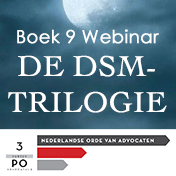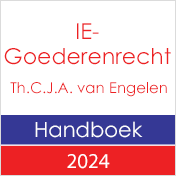 B9 10665. HvJ EU, 17 januari 2012, Conclusie A-G Trstenjak in zaak C-510/10, DR en TV2 Danmark tegen NCB (prejudiciële vragen Østre Landsret).
B9 10665. HvJ EU, 17 januari 2012, Conclusie A-G Trstenjak in zaak C-510/10, DR en TV2 Danmark tegen NCB (prejudiciële vragen Østre Landsret).
Auteursrecht. Conclusie A-G in zeer specialistische zaak over efemere (tijdelijke) vastlegging, de Deense nationale wetgeving en de uitlegging van de het begrip "met hun eigen middelen" in artikel 5, lid 2, sub d Auteursrechtrichtlijn (‘de lidstaten kunnen beperkingen of restricties op het in artikel 2 bedoelde reproductierecht stellen ten aanzien van: (d) tijdelijke opnamen van werken, gemaakt door omroeporganisaties met hun eigen middelen ten behoeve van hun eigen uitzendingen’) en het begrip "namens en onder de verantwoordelijkheid van de omroeporganisatie" in punt 41 van de considerans van die richtlijn (‘wanneer de beperking of restrictie wordt toegepast op tijdelijke opnamen, gemaakt door omroeporganisaties, omvatten de eigen middelen van een omroeporganisatie ook de middelen van een persoon die optreedt namens en onder de verantwoordelijkheid van de omroeporganisatie').
Partijen zijn twee Deense omroeporganisaties, DR en TV2, en een Scandinavische CBO. Het geschil draait dan ook om vergoedingen, in het bijzonder voor het gebruik van muziek in TV-programma’s. Kort gezegd betreft het geschil de vraag of de beperking van art. 5(2)d ook ziet op opnames “which are commissioned from independent external television production companies by DR or TV2 for initial broadcast on DR or TV2 Danmark.” “The referring court essentially wishes to ascertain whether and, if so, under what conditions the recording of a television programme by a production company, where a broadcasting organisation has specifically commissioned the production of that programme for its own broadcasts from that company, is to be regarded as having been made by the broadcasting organisation ‘by means of [its] own facilities and for [its] own broadcasts’ in accordance with Article 5(2)(d) of the InfoSoc Directive in conjunction with recital 41 of the preamble to that directive.”
A-G Trstenjak concludeert dat dat onder voorwaarden inderdaad het geval kan zijn:
98. In the light of the foregoing, I propose that the questions referred should be answered as follows:
1.The expressions ‘by means of their own facilities’ in Article 5(2)(d) of Directive 2001/29/EC of the European Parliament and of the Council of 22 May 2001 on the harmonisation of certain aspects of copyright and related rights in the information society and ‘on behalf of [and/or] under the responsibility of the broadcasting organisation’ in recital 41 of the preamble to that directive must be interpreted with reference to European Union law.
2. Recital 41, in the light of which Article 5(2)(d) of the directive is to be interpreted, is to be understood as meaning that the facilities referred to there include those which are employed for the sole purpose of enabling a particular broadcasting organisation subsequently to use the ephemeral recording to make a lawful broadcast, on the assumption that the recording is made under the responsibility of the broadcasting organisation.
3.A specific assessment as to whether a recording made by a third party (‘the producer’) for use in a broadcasting organisation’s transmission was made ‘by means of [the broadcasting organisation’s] own facilities’ and also ‘on behalf of [and/or] under the responsibility of the broadcasting organisation’, with the result that the recording is covered by the exception laid down in Article 5(2)(d) of Directive 2001/29, is to be based on whether the facilities are employed for the sole purpose of enabling the broadcasting organisation subsequently to use the ephemeral recording to make a lawful broadcast, on the assumption that the recording is made under the responsibility of the broadcasting organisation.
(a)The term ‘own facilities’ in Article 5(2)(d) of Directive 2001/29 is to be understood as meaning that a recording which was made by the producer for use in a broadcasting organisation’s transmissions is covered by the exception laid down in Article 5(2)(d) only if the broadcasting organisation is liable towards third parties for the producer’s acts and omissions in relation to the recording in the same way as it would be if the broadcasting organisation had itself committed those acts and omissions.
(b)The condition that the recording must be made ‘on behalf of [and/or] under the responsibility of the broadcasting organisation’ is not, however, always automatically satisfied where the broadcasting organisation has commissioned the producer to make the recording so that the broadcasting organisation can transmit the recording in question itself, on the assumption that the broadcasting organisation concerned has the right to transmit the recording in question.
For the purpose of answering Question 3(b),
(i) it is immaterial whether it is the broadcasting organisation or the Producer which has the final and conclusive artistic/editorial decision on the content of the commissioned programme under the agreement concluded between those parties;
(ii) the question whether the broadcasting organisation is liable towards third parties for the producer’s obligations in relation to the recording in the same way as it would be if the broadcasting organisation itself had committed those acts and omissions is a decisive consideration;
(iii) it is immaterial whether the producer is contractually obliged by the agreement with the broadcasting organisation to deliver the programme in question to the broadcasting organisation for a specified price and has to meet, out of this price, all expenses that may be associated with the recording;
(iv) it is material whether it is the broadcasting organisation or the producer which assumes liability for the recording in question vis-à-vis third parties, although both may be jointly liable.
(c) The condition that the recording must be made ‘on behalf of [and/or] under the responsibility of the broadcasting organisation’ is not automatically satisfied where a broadcasting organisation has commissioned the producer to make the recording so that the broadcasting organisation can transmit the recording in question itself, on the assumption that the broadcasting organisation in question has the right to transmit the recording, where the producer, in the agreement with the broadcasting organisation relating to the recording, has assumed the financial and legal responsibility for (i) meeting all the expenses associated with the recording in return for payment of an amount fixed in advance; (ii) the purchase of rights; and (iii) unforeseen circumstances, including any delay in the recording and breach of contract, but without the broadcasting organisation being liable towards third parties in respect of the producer’s obligations in relation to the recording in the same way as it would be if the broadcasting organisation had itself committed those acts and omissions.
Lees de volledige conclusie hier.



























































